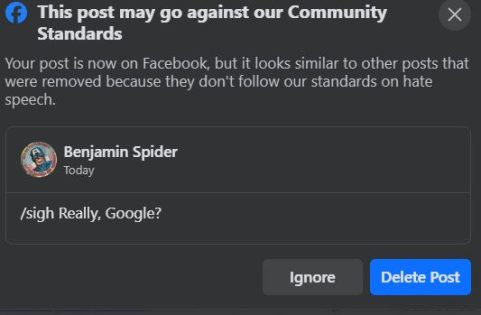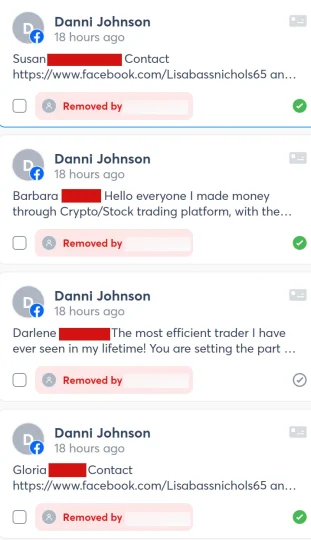I own a few sites that produce content daily and one that does nostalgia. Nostalgia, like the Dick Van Dyke Show, an iconic television series from 1961 to 1966 on CBS. That featured Mary Tyler Moore and that Mary Poppins guy. Dick Van Dyke will always be the Mary Poppins guy to me. Which brings us to today; Google Adsense sent this to me.

But I am guessing this policy violation notice was triggered by the name Dick, maybe even the last name Dyke. Sometimes, I share these with my friends and family on Facebook because it’s clear there is no violation. As I hit share to the latest misfire from Google on Facebook, I get:

I didn’t delete the post. But I add that screenshot of this Facebook notice to add to the humor.
A few years ago, he liked, shared, and thanked us for one of our articles. A friend made me a coffee cup with his comment in celebration, and I broke it. :-/ We are not going to stop writing about Dick Van Dyke, because big tech can do better.
Facebook/Meta and Google have the technology to prevent real problems
Facebook has the capability to detect text in an image, and they can see play buttons. This has been the case for a while. As far back as 2018, it was the first time I had an ad turned down because there was too much text in it. There was also a time when someone who no longer works for us took a screenshot of an unplayed YouTube video we had an article written about for use as a featured image. It was posted on Facebook and got enough traffic that recommended we advertise it, and my assistant did so without looking at it. Despite being recommended for advertising, Facebook shut it down for having a play button. …which begs the question of why it got traffic and why it was recommended to be advertised.
Facebook is not perfect, as there was a feel-good story about a rescued baby cow. Or, as some like to point out, it’s called a calf, but it’s still a baby cow since she is a girl. It sounds cuter than a calf. Furthermore… oh, sorry, we were talking about advertising. Facebook determined the image was nudity. I responded with It’s not easy to put pants on a cow as a reason as to why it did not violate their TOS. Facebook’s, likely automation, response to my sarcasm: I had not made my case. I tried again with: it’s a cow; cows are supposed to be naked. Again, likely automation, Facebook responded that I had not made my case again and warned me that the next time I disputed their claim, my ad account would be terminated if they did not rule in my favor. I decided to stop messing around and contact my ad rep, who took a week to get it fixed.
As for how I know, it’s hard to put pants on a cow… We were talking about Google and Facebook and how they target the wrong things. >.>
Facebook and Google have a bigger problem than Dick and naked cows.
As a Publisher, it feels like Google puts more constraints on what I do than they do on advertisers. In a recent post, I shared how I have to screen out a lot of garbage in AdSense. Garbage that could be detected by the same automation that detects if I talk about Dick… but does not see the rest of the name, Van Dyke. Facebook is just as bad because, as a content creator, it feels much harsher on content creators than they are on scam accounts. Often, spammers and hostile accounts see no repercussions when reported. In one case, I reported one that claimed to be part of Subway’s rewards program. Facebook sent me a notice that they found no issue with the page, even after I disputed their findings. I report actual nudity, and they again see no problem. Nevermind they put their real users at risk with accounts like this:

Thankfully for our readers, I have moderators. We caught this spammer before anyone knew they were there. But we mostly run into friend request scammers like this.

That is not James Terry’s image. It is Paul John Hollywood from The Great British Bake Off. This account had tried to send a friend request to a friend of mine, not knowing she was a fan of the show. Some day, I will cover fake accounts on top of moderation. But, this could all be avoided.
Facebook could have detected both accounts
Both accounts have very common traits that are not the same as a regular user that Facebook can detect.
- Both accounts were less than a week old before we saw them
- Both have images that belong to someone else.
- Both engage in a heavy campaign of contacting people in comment sections or by sending messages.
- Many use the same comment over and over again.
That does not even scratch the surface of other things that are visible, nor what factors that Facebook can see about these accounts that I can not. These scams have real consequences for real people, and they hurt the buying power of victims. Big tech has not realized that big numbers are less important than consistent numbers. Because people who get burned by those scams tend to stop using Facebook and get ad blockers. But both like having big numbers to show off, ignoring quality.
So is that Dick Van Dyke post ok to advertise on?
Yes, minutes before I published this post, Google removed the policy violation. Likely, I will see a notice after a few days that is unclear about it being removed. But it was resolved, and we will continue to do posts about the Mary Poppins Guy. Chim Chim Cher-ee!!!
As for Facebook… time will tell if there is a problem.
